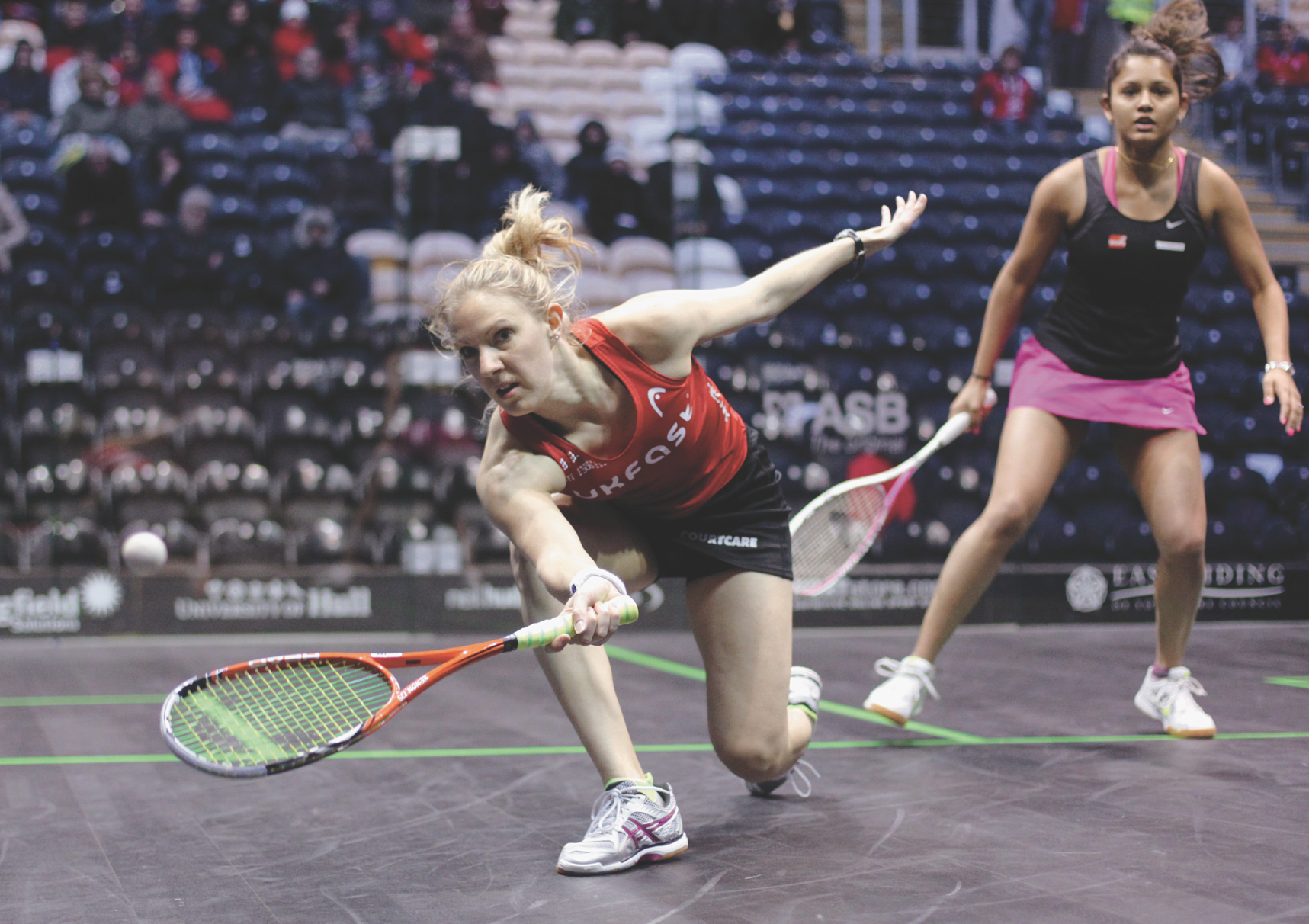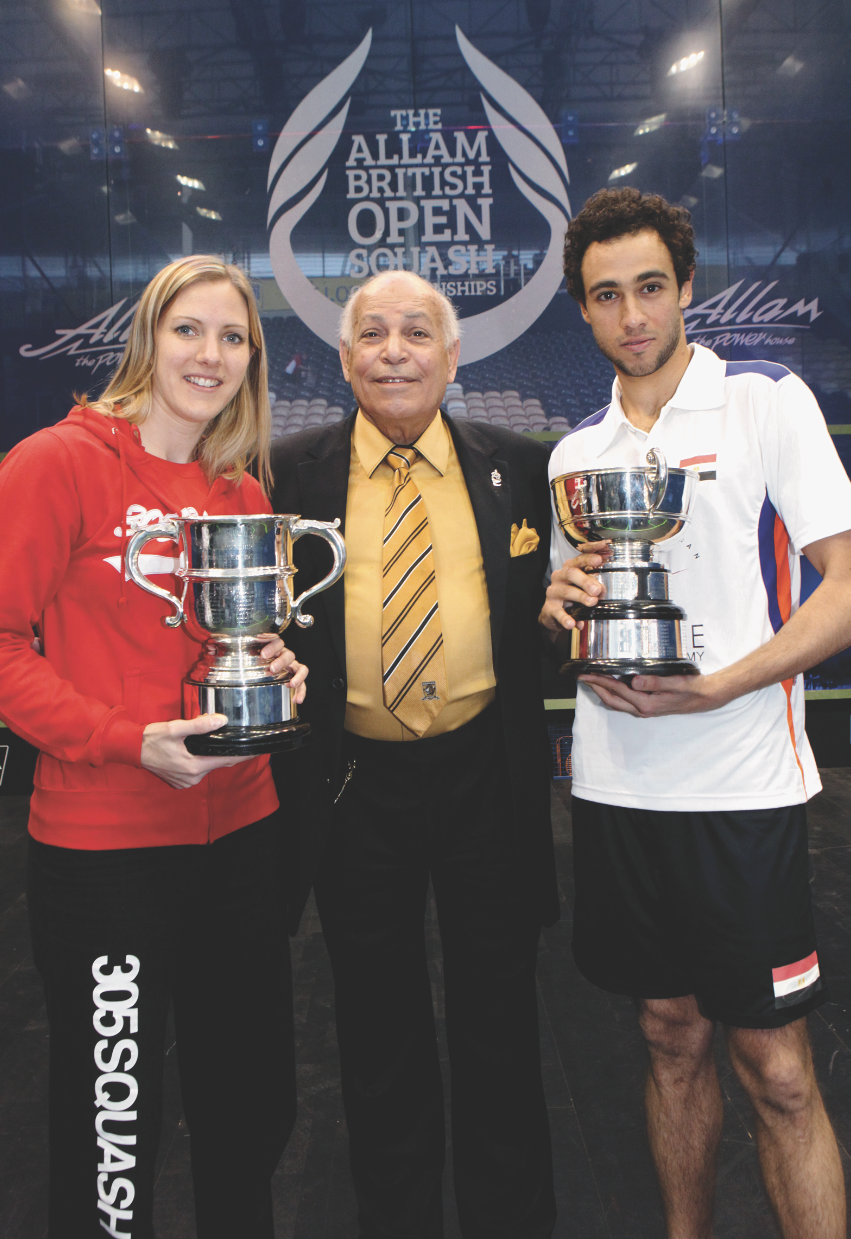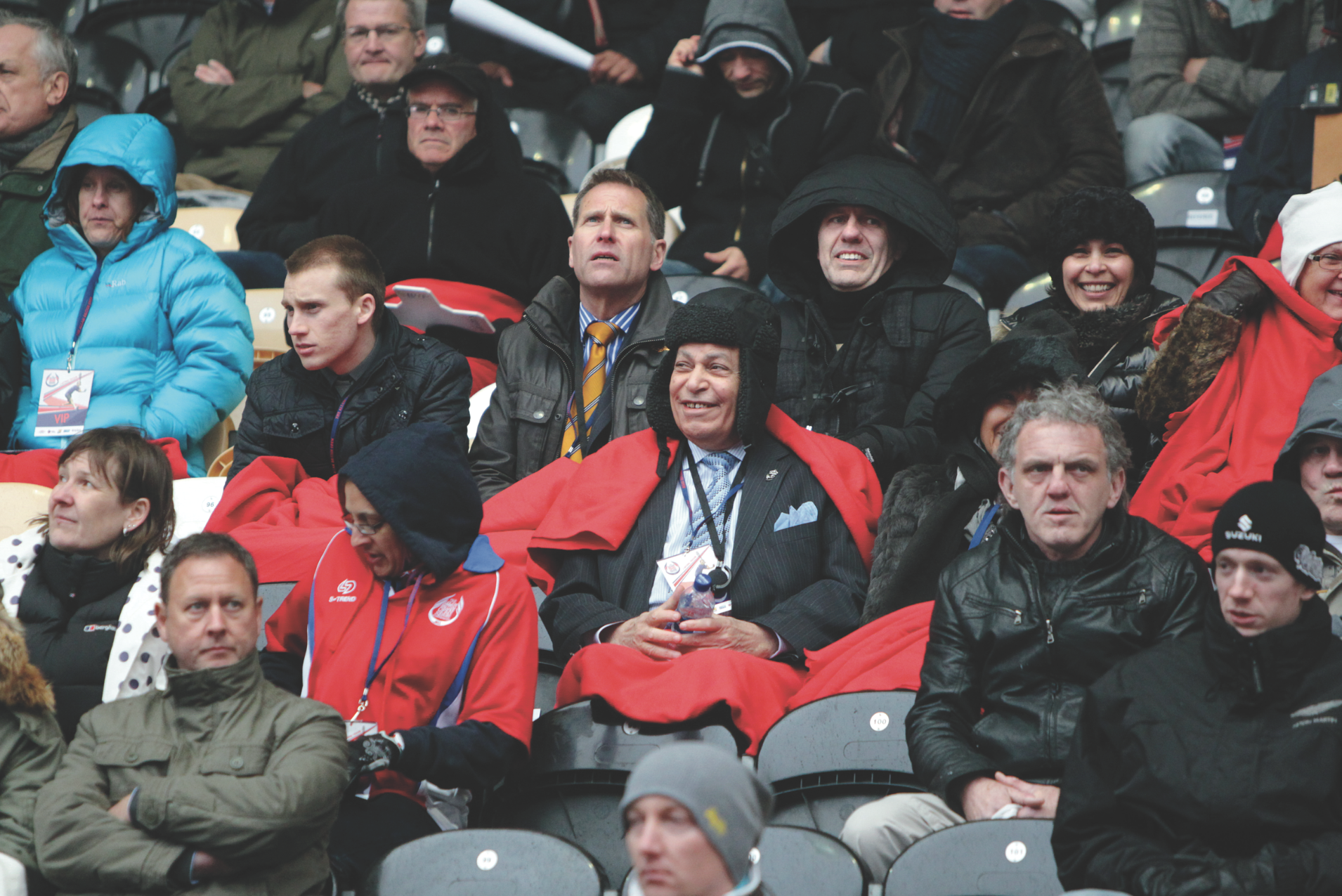
By Richard Eaton
Photos by Steve Line/squashpics.com
There was a throw-away hint as to why the world’s most successful squash player might suffer her most startling defeat in four years, not long before the British Open began.
It was uttered by her coach Liz Irving, when asked if Nicol David’s great ambassadorial efforts for squash’s Olympic bid might have affected the champion’s form. In previous weeks David had already lost twice to Laura Massaro, and half Malaysia feared she was on the wane.
“You have to wonder if it is detrimental a little bit,” was Irving’s answer. “She has put all her heart and soul into the Olympic bid process. It’s very close to her heart.”
 No one wishes to take away from the achievement of Massaro, whose 11-4, 3-11, 12-10, 11-7 win in the final made her the first Englishwoman to win the British Open in more than 20 years.
No one wishes to take away from the achievement of Massaro, whose 11-4, 3-11, 12-10, 11-7 win in the final made her the first Englishwoman to win the British Open in more than 20 years.
It was also her third win in four matches over David. Her all-round improvements had been so tenaciously achieved at the age of 29 they even had echoes of her compatriot Nick Matthew, perhaps the most remarkable late developer of all time.
They underlined her as the closest and worthiest rival to the seven-year world number one. For all that it was an unexpected outcome. It was David’s biggest upset since losing to Madeline Perry of Ireland in the 2009 British Open. There were oddities about the outcome as well.
No one wishes to take away from Massaro either by suggesting that Olympic campaigning was anything other than one of several possible causes of David’s loss.
Her vulnerability had even become an issue for the director-general of Malaysia’s National Sports Council, Datuk Seri Zolkples Embong, who suggested that David’s training program and tournament schedule should be made less demanding now that she was in her 30th year.
Irving pointed out this had already been done. It was nevertheless a reminder that David has long been adding to her athletic game as an investment for when she can no longer rely so much on her outstanding physical abilities.
Other reasons for the champion’s demise on the chilly east coast of England were conditions which rendered mobile containment much less effective, as well as three disruptive changes of venue, and Massaro’s admirable response to home advantage. Then there was the champion’s tendency to hyper-tension.
If this was a factor in David’s inhibited performance in the final it would be not be surprising. Only an hour afterwards David was hurrying to the railway station, catching a train to London, and connecting with a flight to St. Petersburg. There, along with Ashour, who cheerfully missed the train, she made an important presentation to the IOC.
This schedule resurrected memories that David had described in her presentations to the IOC for both the London and the Rio Games as “nerve-racking”, and admitted to being near to tears when they failed.
 Now David delivered more quotes about the Olympic bid than her British Open defeat. “Of course I am disappointed to lose, especially as I prepared well,” she said. “But there are other things to look forward to.”
Now David delivered more quotes about the Olympic bid than her British Open defeat. “Of course I am disappointed to lose, especially as I prepared well,” she said. “But there are other things to look forward to.”
Then she elaborated on one of them. “For so long I have dreamed of competing in the Olympics, so to be presenting to the IOC executive board is a true honor. I am delighted to play my part in an incredibly important moment for squash. I just want to show how much competing in the Games would mean to me.”
Without doubt David’s performance in the British Open final was highly important to her too—she had given extra time to her preparation after all—but it became oddly uneven.
From early in the second game till near the end of the third she looked well capable of winning. But both her start and her finish to the match were a disappointing contrast.
Getting in front of the opponent and using the volley to apply pressure were even more important than usual in the cool conditions. Massaro did that more in the first game, and David more often in the second. Each was rewarded by winning a game one-sidedly.
The third game was more of a fight, and became pivotal. David looked odds on to take it when she went 10-7 head, but Massaro saved the first game ball with a fierce forehand boast, and the second with a clinging backhand drive.
Before the third game ball there was a significant moment. David broke a string and had to change rackets. The minute’s delay created time for thought and generated extra pressure. Massaro’s response was a fine drive which hit the nick between the floor and the sidewall, and rolled dead. It was a dramatic moment.
There was more of the unexpected to follow. When Massaro reached game ball at 11-10 a traffic problem occurred, causing the referee to award a let—only for the Englishwoman to get the decision overturned by appealing to the video review.

The ensuing penalty point changed everything. Not only did it give Massaro the game, putting her 2-1 up, it changed the psychology of the match. Thereafter David seemed far less confident, relying more on containment, and making important mistakes with drop shots. She finished the match with a volley into the tin.
Massaro was in tears when she realized what she had achieved. “When I reached 8-4 (in the fourth game) I started to think I had a good enough lead to win,” she revealed.
“I was suddenly doubting myself and felt my arm go tight. I was thinking ‘don’t mess this up, don’t mess this up.’ I guess my psychologist won’t like to hear that!”
Earlier in the tournament Massaro had twice been in greater danger of defeat —once in the semifinals against Raneem El Weleily, the third-seeded Egyptian, and once in the second round against Dipika Pallikal, the 15th-seeded Indian. El Weleily led 8-7 in the third game and 7-4 in the fourth before Massaro fought her way doggedly out of difficulties and edged through by 8-11, 11-6, 11-8, 11-9 to win.
She was in even bigger trouble against the shot-making Pallikal on a freezing evening. Pallikal strode around striking exciting winners and advanced to a lead of a game and 10-6 before self-destructing spectacularly. Four attacking boasts hit the tin in the next six points.
Massaro played better after that but her dicey survival by 7-11, 12-10, 11-9, 11-6 showed how surprises were possible at any time in these conditions. It also suggested that Pallikal’s de-brief with her coach, Sarah Fitz-Gerald, five times the former world champion, will have been very frank indeed.
David’s path to the final travelled via Joshna Chinappa of India, Sarah Kippax of England, Joelle King of New Zealand, and Alison Waters of England. She had to save a game point in the first game against King and another in the second game against Kippax. Against Waters, who had beaten her in New York in September, she was overwhelming and appeared to have built encouraging momentum.
Unfortunately, like many of the women, David had had to adapt like never before. Not only was there a move from indoor conventional plaster-walled courts to an outdoor glass court, but a temperature drop of 15 degrees centigrade, greatly affecting the bounce of the ball.
This was because women’s first round matches, unlike men’s, were held indoors at Pontefract squash club, 50 miles from the main venue, outdoors at Hull City football club. When bad weather forced play indoors again, to club courts in Hull, before the tournament changed back out again to the glass court, it became triply demanding for the women.

David is rarely one to criticize, but she commented on this. “It would be better if everyone started straight away on the glass court,” she said. “Or perhaps if we did it half and half with the men, it would give us a better chance. It’s a shame. But I’m used to having to adapt.”
Difficulties with all that may have been a factor in the second round four-game exit of last year’s runner-up, Nour El Sherbini. However, the 17-year-old Egyptian was unlucky to be confronted so early on by her compatriot Omneya Abdel Kawy, who had advantages of seniority and front court skills which might have been honed specifically for such northern conditions.
The tournament’s first upset, however, occurred earlier, within three hours of the start, when Kippax, familiar with Pontefract’s courts, overcame Natalie Grinham, another former British Open finalist, in five games. The Australian-raised Dutch player would probably have survived had she converted game points for a two-game lead.
Very soon Sarah-Jane Perry, the Englishwoman who has this year pushed into the world’s top-20 for the first time, almost caused upsets on both a warm and a cold court. First she beat Low Wee Wern, the seventh-seeded Malaysian, and then came within two points of a straight games win over Kasey Brown, the 12th- seeded Australian, before losing 12-10 in the fifth.

But perhaps the most popular upset was brought about by Rachael Grinham, four times the former British Open champion, because it was a sequel to her noisy and discouraging loss to Nicolette Fernandes at the World Open in Grand Cayman in December.
This time the elder Grinham sister looked certain to lose to the Caribbean qualifier again. Two games down and within three points of the exit in the fourth game she lobbed, dropped, floated and coaxed the ball around with tenacious delicacy while recovering to win 10-12, 1-11, 11-7, 11-9, 11-8.
The 36-year-old’s judgment on the comeback should also have made her popular. “I think I’m getting better,” she said.
But Massaro’s words were the ones which may resonate the longest. That’s because they were a warning. “I have improved technically,” she said. “My ball control is better. I am getting on to the volley better. World number one has always been my goal. Nicol has been there forever.”





